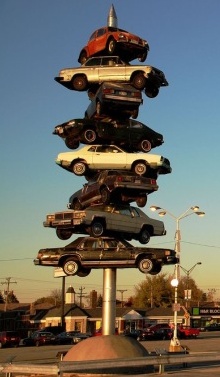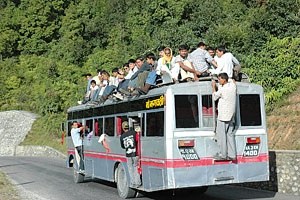 The Boston Globe reports today that – surprise! – President Obama’s “Cash for Clunkers” program did little good for (and perhaps will end up doing harm to) those it purported to benefit:
The Boston Globe reports today that – surprise! – President Obama’s “Cash for Clunkers” program did little good for (and perhaps will end up doing harm to) those it purported to benefit:It has been nearly a month since the car-buying frenzy of the Cash for Clunkers program ended, and many area auto dealers are longing for the good old days of July and August.The Globe, in describing the typical C4C trade-in as a “rusting junker”, is misrepresenting reality. A significant number of the trade-ins were in good working order.
Like consumers nationwide, Massachusetts residents rushed to take advantage of the federal voucher program, which offered them up to $4,500 on old gas-guzzlers to be put toward the purchase of new, more fuel-efficient vehicles. About $65 million worth of vouchers were handed out statewide during the monthlong program that ended Aug. 24.
But once the federal money dried up, so did the sales rally. Now, customers at dealerships like Silko Honda in Raynham are few and far between, and inventory is once again accumulating.
Manager Adam Silverleib said business was “pretty intense’’ as a result of the federal stimulus program, with the dealership hustling to accommodate customers and handle the piles of paperwork required for them to receive reimbursement on vouchers. “Now we’re kind of back to where we were in the spring,’’ he said.
In an attempt to draw customers back to showrooms, some dealers are offering new incentives, albeit none as enticing as a $4,500 for a rusting junker. Silko, for example, is promoting 2.9 percent financing on new Accords, along with other deals on its website.
Nationwide, customers snatched up 700,000 new cars, most of them foreign-made, and the government ended up paying out nearly $3 billion toward the purchases. But from the start, analysts predicted that Cash for Clunkers would not boost sales for the year. September’s sales swoon seems to be making their case. Car sales are usually slow after Labor Day, but because of the recession consumers this year are especially reluctant to say yes to major purchases. To make matters worse for dealers, most are still waiting for voucher reimbursements.
“It was probably, in the end, a complete waste of taxpayer money,’’ said John Wolkonowicz, a senior auto analyst at IHS Global Insight, Lexington forecasting firm. “The dealers, who were supposed to be the primary beneficiaries, many were forced into cash flow problems because the government didn’t pay them in a timely fashion.’’
Without the C4C program, many (if not most) of the 700,000 purchasers would not have bought a new car this year. Instead, money that would have remained unspent (because consumers were reluctant to make a major purchase in this economy) or that would have been spent on other sectors of the economy ended up being reallocated to these purchases. How many of these purchasers went even further into debt to take advantage of an irresistible offer?
So, economically speaking, the C4C program didn’t really do any favors for anyone but those who were already planning to buy a car this year.
What about the dealers? C4C made its appearance in the midst of an economy where the public simply wasn’t interested in buying new cars. There’s no denying that the dealers were hurting.
Setting aside the C4C administrative problems (denied or delayed reimbursements), times were briefly good for the dealers. As the Globe excerpt above shows, a lot of stale inventory was moved off the lots.
But the demand was completely artificial, and once the incentives ended, the dealerships became ghost towns again. This was little more than the burst of energy that comes with a sugar rush, and now the post-sugar crash has come.
In the long term, C4C did not do the dealers (or the manufacturers they represent) any favors.
What about the economically disadvantaged? Even with the incentives, they were still pretty much priced out of the market. If they want to have their own wheels, they still have to go the used-car route.
But wait! Nearly three-quarters of a million cars that would have been destined for used car lots were deliberately destroyed, regardless of condition! Used car inventories are down, driving up the prices of the used cars that remain.
Far from doing the disadvantaged buyers any favors, C4C may have ended up putting a car even further out of reach for them.
So. Cui bono? Who benefits?
No doubt, the president expected to reap a political benefit from appearing to help those who are suffering in the current economy, but…
He could have done this without requiring that every trade-in be destroyed.
Cash For Clunkers was never about economic stimulus, but rather about the Obama administration’s “green” agenda, which is predicated on the unproven assumption that mankind’s activities are deleteriously affecting our planet’s climate.
 There are many on the environmental left who believe that eliminating private ownership of automobiles is a good first step toward restoring the balance between man and nature. This idea appears to have found fertile soil among some members of the Obama administration.
There are many on the environmental left who believe that eliminating private ownership of automobiles is a good first step toward restoring the balance between man and nature. This idea appears to have found fertile soil among some members of the Obama administration.It may seem far-fetched to suspect the administration of working toward this goal, but think about it: If someone wanted to eliminate private ownership of cars, and he wanted to do it in a way that wouldn’t be politically disastrous, how would he do it differently?
The problems created or exacerbated by the C4C program won’t be obvious until later, and by then Obama will be able to shift the blame elsewhere.
(Credits: Photos found here and here)
-----
9/21 UPDATE: A commenter reminded me of another prominent victim of the C4C program: charities that rely on used-car donations. See, for example, this August 9 USA Today article.
2 comments:
What cash for clunkers did was take 700,000 RUNNING cars and destroy them. Many of these cars were in good condition and had much life left. As a result, revenue was lost by auto repair shops, parts stores, used car dealers and car donation charities.
Excellent points regarding other victims of this program. Thanks for mentioning them.
I read about the car charities several weeks ago, but it slipped my mind at the time I was writing my post.
Plain and simple, Obama's concern for the environment trumped his reputed concern for the poor.
Post a Comment